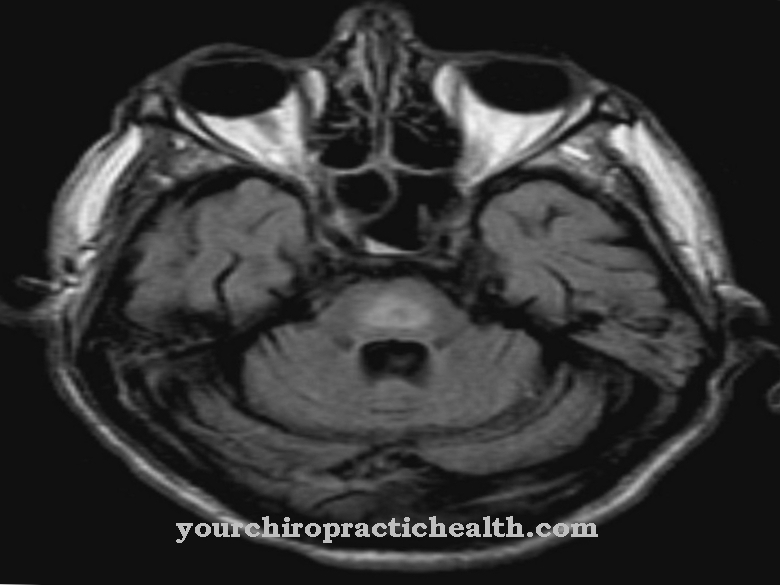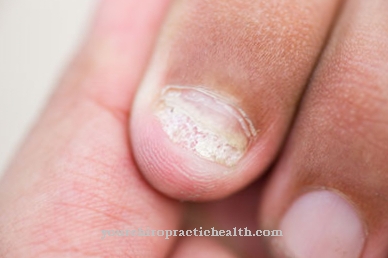Billions of microorganisms settle on the skin, the mucous membranes, in the small and large intestines. This symbiosis supports the metabolism and ensures an intact immune system. The beneficial microorganisms train the B-lymphocytes and ensure a balance in the intestines. If this symbiosis is disturbed, a Dysbiosis develop.
What is dysbiosis?

© olenka758 - stock.adobe.com
If the proportions within the intestinal flora are disturbed and pathogenic germs spread, then there is dysbiosis. The specialist literature also speaks of a dysbacteria or an intestinal flora disorder at this point.
Beneficial microorganisms in the intestine have a number of tasks:
1. They keep the settlement and spread of pathogens within limits. They do this by releasing certain substances such as hydrogen sulfide, hydrogen peroxide and short-chain fatty acids.
2. They stimulate and train the immune system. Due to their presence, new antibodies are constantly being formed. Macrophages (phagocytes) are now also emerging in greater numbers.
3. They produce small amounts of vitamins: Vitamin K (Coli bacteria), Vitamins B3, B5, Folic acid (Clostridia), Vitamin B12 (Lactobacilli), Biotin (Bacteroides).
4. With their work they nourish and supply the lining of the colon.
5. They promote the metabolism of the intestinal wall through certain substances that they excrete.
The biodiversity of these microbes is therefore great and their tasks are extremely diverse.
causes
The causes of a disturbed intestinal flora are manifold. First and foremost are infections of the intestinal tract, for example by fungi, streptococci, staphylococci, parasites, typhoid and amoeba. Diet plays a major role in shifting the intestinal balance. If it is particularly rich in protein or fat, the putrefactive bacteria like to multiply.
The lactic acid bacteria then reduce their population. Due to the increased fermentation in the intestine, significantly more toxins are formed. These are absorbed through the intestinal wall and reach the entire organism through the circulation. The same goes for sugar.
Medicines such as antibiotics, the "pill" or glucocorticoids have a major impact on the intestinal flora. In their mode of action, they attack the beneficial microorganisms directly and destroy them. Certain environmental pollutants, such as cadmium, inhibit the growth of microorganisms. The lack of stomach acid, bile or pancreatic juice also has an unfavorable effect on the intestinal balance. If the immune system is weakened, fewer antibodies penetrate the intestine and there is a shift in the environment.
You can find your medication here
➔ Medicines against flatulence and digestive problemsSymptoms, ailments & signs
With dysbiosis, those affected usually suffer from symptoms in the stomach or intestines. These complaints have a very negative effect on the patient's quality of life and can significantly reduce it. Symptoms such as flatulence, diarrhea or constipation, bloating, food intolerance and other gastrointestinal disorders are an indication of dysbiosis.
Fatigue, headaches and migraines can occur. Since the pathogenic germs excrete toxins, the development of other systemic diseases is promoted. The immune system is so busy defending itself against toxic substances and germs that it hardly has any capacity for further stress.
The permanent complaints can also have a negative effect on the psyche, leading to depression, irritability or other psychological upsets. The dysbiosis also causes various food intolerances, so that the patient is severely restricted in his diet. There is common pain in the stomach and general tiredness or fatigue.
Migraines can also occur and make everyday life difficult for those affected. In general, dysbiosis has a very negative effect on the patient's state of health and can also strongly promote the development of other diseases. This often leads to other infections or inflammations. If the dysbiosis is not treated, it can also lead to a reduced life expectancy. In the worst case, the kidneys or liver can fail, which can lead to death.
Diagnosis & course
The diagnosis of dysbiosis is made with the help of a stool examination. The patient receives two tubes for this in the practice. At home he will take two stool samples. These stool samples are sent from the practice to a laboratory. A culture is created there and evaluated after four days. The diagnosing doctor receives the results and discusses them with his patient.
The results of the stool examination provide information about which therapy will be used in the future.
If the dysbiosis is left untreated, it leads to a deteriorating physical condition. Intoxication of the body will reduce cell metabolism. The cells no longer receive any energy or oxygen. Nutrients can hardly be absorbed. The liver and kidneys are overwhelmed with detoxification. Illnesses, states of exhaustion, migraines and a gradual decline in strength arise.
Complications
Due to the dysbiosis, the patient mainly suffers from complaints and complications in the intestinal area due to the high susceptibility to infection. In most cases, the greatest complication is food intolerance. In this case, the patient is very limited in his choice of food and has to adhere to a strict diet to avoid pain, diarrhea or nausea after eating.
The quality of life is reduced due to the intolerance. In many cases it is not possible to completely limit the intolerance, so that the food has to be avoided. Crohn's disease can also occur. Treatment is only possible if the cause of the dysbiosis has been precisely clarified.
In many cases, it takes a long time for the doctor to identify the cause of the disease. Treatment often begins with the help of drugs and probiotics. The patient's diet also has to be completely changed, often a so-called food diary is kept for this.
If the diet is followed, the course of the disease can be positive without further complications. Life expectancy is not reduced due to the dysbiosis as long as the patient eats a healthy diet and follows a healthy lifestyle.
When should you go to the doctor?
Dysbiosis does not necessarily require medical treatment if the causes are known and the condition only lasts for a short time. During or after treatment with antibiotics, the gastrointestinal tract is disturbed, which is often associated with diarrhea, as the antibiotics not only kill harmful pathogens, but also useful intestinal bacteria.
In healthy adults, however, the intestinal flora regulates itself again at the latest after stopping the medication. For some people, it is also sufficient to consume special yoghurt cultures during or after treatment with antibiotics in order to rebuild the intestinal flora.
However, if dysbiosis persists for weeks or even months, this can lead to impairment of the intestinal mucosa.If a dysbiosis does not heal quickly, a doctor should therefore be consulted. Typical symptoms of intestinal flora disorder are severe flatulence, a feeling of fullness even after light meals, and the alternating occurrence of constipation and diarrhea.
Some patients also experience fatigue and headaches, or even develop migraines. In these cases, a doctor should be consulted promptly so that the balance of the intestinal flora can be restored before serious complications set in.
Doctors & therapists in your area
Treatment & Therapy
The dysbiosis can be treated with the help of microbiological preparations. E. coli and enterococci in both dead and living form form the basis for these preparations. There are mixtures with bacterial metabolic products and cell components, e.g. B. Pro-Symbioflor® or Colibiogen oral®.
This sensitizes and trains the immune system. Other products contain living physiological germs. They are used, so to speak, as a second training stage for the immune system and are intended to repopulate the intestines, e.g. B. Paidoflor® or Mutaflor®.
Other microbiological preparations consist of living germs that do not belong to the intestinal flora. Certain properties of these organisms are used therapeutically, e.g. B. toxin binding. Still other preparations contain a mixture of killed and viable germs.
Therapy takes place in four steps:
1. Inactivated E. coli bacteria and enterococci are used in the preliminary phase.
2. The first training phase for the immune system begins with living enterococci. Among other things, Symbioflor 1® is used for this.
3. The second training phase contains live enterococci and E. coli bacteria mixed, e.g. B. Symbioflor 2®.
4. Lactic acid bacteria are prescribed to supplement the new intestinal flora. Its positive effects, especially in the case of allergies, skin diseases and fungal infections, have been confirmed many times.
This microbiological therapy rebuilds the microecological balance in the intestine. In addition, it trains the body's own defense system. The time frame for this therapy is between four and six months, in exceptional cases up to two years.
Outlook & forecast
In dysbiosis, the bacterial balance in the intestine is disturbed. In its early stages, dysbiosis is a disease that is usually good and easy to treat, but the patient needs a little patience. The medication should not take place independently, but always in close consultation with the treating doctor and under regular medical supervision. Usually, after a while and some experimentation, the cause of dysbiosis can be reliably found out, and treatment can lead to complete cure.
An untreated dysbiosis, however, can form the breeding ground for various other secondary diseases. Therefore, the dysbiosis should by no means be considered unimportant or therapeutically neglected, but should definitely be treated in the early stages.
Dysbiosis can also have serious effects on other diseases such as Crohn's disease, diabetes or irritable bowel syndrome. Research shows that dysbiosis can be both the cause of these diseases. Other cases have been documented in which the dysbiosis was not the cause but negatively exacerbated the diseases mentioned above.
At the same time, dysbiosis weakens the patient's immune system and hinders the targeted absorption of various important nutrients. It also leads to annoying to very painful intestinal and digestive problems such as flatulence and very severe diarrhea. If the dysbiosis is not treated medically, a spontaneous healing is very unlikely.
You can find your medication here
➔ Medicines against flatulence and digestive problemsprevention
Maintaining a balanced environment in the intestine is of great importance for the entire body. Natural medicine recommends colon cleansing with herbal mixtures and bentonite once or twice a year. A purchased intensive cure can even be integrated into the daily routine alongside normal nutrition.
The same applies to hydro-colon therapy as colon cleansing. Then the intestinal flora should be rebuilt with probiotic bacteria. The conversion of the daily diet to the basic range provides the beneficial microorganisms with the environment in which they feel comfortable.
Aftercare
In the case of dysbiosis, the patient usually has no special measures or options for follow-up care. With this disease, first and foremost, rapid and, above all, early detection must take place so that there are no further compilations or complaints. The earlier the dysbiosis is recognized and treated, the better the further course.
In general, patients with this disease should take care of their intestines and avoid eating fatty or very sweet foods. Ordinary food can only be consumed again after successful treatment of the disease. The treatment of dysbiosis is usually done with the help of medication. The person affected should ensure that the dosage is correct and that it is taken regularly in order to treat the symptoms.
If you have any questions or are unclear, you should always contact a doctor first. After a treatment, further regular examinations of the intestine can be carried out in order to identify any symptoms or damage that may still exist. Usually, dysbiosis does not reduce the life expectancy of those affected. Of course, since the disease can recur even after successful treatment, the trigger should be avoided.
You can do that yourself
In dysbiosis, useful intestinal bacteria are displaced by pathogenic microorganisms. The intestinal flora is out of balance. Those affected can take a number of self-help measures to prevent this development and to normalize the intestinal flora again.
An important contribution to the prevention of dysbiosis is a healthy, low-fat diet rich in vitamins, vitamins and fiber. Whole grain products, nuts, seeds, sprouts as well as lots of fruit, vegetables and fresh salad are recommended. Sweets and white flour products are considered counterproductive and are suspected of promoting harmful intestinal fungi. Food of animal origin should also be consumed moderately if necessary. Nicotine and excessive alcohol consumption damage the immune system and also have a negative effect on the gastrointestinal tract.
Anyone who is unsure about nutrition should seek advice from a trained nutritionist. Because of the great influence of nutrition on health, many health insurance companies offer such consultations free of charge or at least reimburse part of the fees.
Regular exercise is also essential for a healthy bowel, although a brisk walk of around 30 minutes is enough to stimulate the bowel.
If dysbiosis has already occurred, natural medicine recommends a thorough colon cleansing followed by reconstruction of the intestinal flora. For this purpose, special bacterial strains are used, which are available in capsule form in pharmacies and drugstores without a prescription.

.jpg)
.jpg)
























